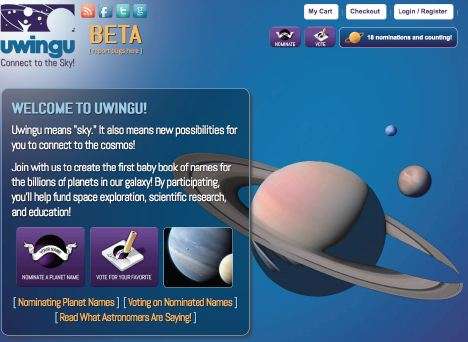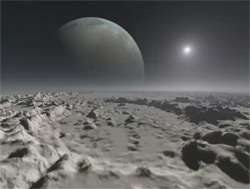Visit Uwingu, name an exoplanet

Astronomers have now discovered over 1,000 planets orbiting other stars, and right now these exoplanets all have boring, license-plate-like names, such as HD85512 and GJ 436 instead of endearing, "real" planet names that might offer hints of what that world could be like. And recall the recent extrapolation of how many habitable planets might be in the Milky Way? A team using the ESO's HARP's spectrograph determined there might be upwards of 160 billion worlds out there for us to find, and perhaps eventually name. How might we come up with that many names?
Uwingu, a startup company that is hoping to use innovative ways to fund space and astronomy research, has an idea of how to do that. Their first commercial project is to challenge people to create a 'baby book of planet names' for all these planets, as suggestions for future names for other worlds.
"The many, many planets discovered across the galaxy in past 20 years are a tribute to our natural human desire to explore beyond the horizon," said noted planet hunter Dr. Geoff Marcy of the University of California at Berkeley, who is also an advisor for Uwingu. "Now people all over the world can participate in these discoveries in a new way, giving identities and even personality to billions of planets in our galaxy for the first time."
How does this raise money for space science? Submitting suggestions for names cost $.99 each, and Uwingu will use proceeds from this project and future ones to create funds for grants that space researchers, space educators, and project teams can apply to use.
Uwingu's first project is technically now in "beta testing," and in a press release, the organization said the public can participate immediately, helping to generate a new source of funds for space exploration, research, and education.
But it doesn't end with just suggestions. People can vote on the top names (each vote also costs $.99), and as Uwingu CEO and founder Alan Stern told Universe Today, they are hoping the voting goes viral among the social media savvy.

"This is a way for people everywhere to connect with space," he said. "You can suggest a name and tell all your friends to vote, and the top names will be the first to be used. If you nominate the name of someone famous, hopefully they'll get in on the excitement and ask their fans to vote, too."
The Uwingu team suggests nominating planet names for your favorite town, state, or country, your favorite sports team, music artist, or hero, your favorite author or book, your school, your company, for your loved ones and friends, or even for yourself.
The names won't be officially approved by the International Astronomical Union, but Stern said they will be are similar to the names given to features on Mars by the mission science teams (such as the "Jake Matijevic" rock recently analyzed by the Curiosity rover) that everyone ends up using. This also solves the problem of how to come up with names, a task that the IAU has yet to discuss.
Initial reactions to the planet naming project – and to Uwingu itself—have been mixed. During their Indigogo fundraising, the Uwingu team didn't disclose what types of things they would be selling or doing to raise funds, which was a concern to some in the space and astronomy community who normally support almost any space-related initiative. In a previous interview with UT, Stern said being secretive was a way to generate interest and likened it to how Apple announces a new product.
While there seems to be excitement about the opportunity to suggest names for exoplanets (as of this writing 74 names had been nominated, with numerous votes for each name), some early reactions have been that this might be similar to the 'name a star' registries that are unofficial and quite expensive.
IAU's stance on naming exoplanets has been that since it appears there are going to be so many of them, naming them will be difficult. However, in an email reply, the former president of the IAU Planetary Systems Science body, Karen Meech said that at the IAU meeting in Beijing this summer there was discussion about the need to set up a group to look into the issue of exoplanet names.
And Meech did confirm that since the IAU is the only scientifically recognized arbiter of astronomical names, any contests for names from the public will not be officially recognized by the scientific community.
But if the problem is in the amount of names that will be required, that's where Uwingu's crowd sourcing idea seems to fit the need.
And for those who are critical of Uwingu's methods, Uwingu is so far the only group or organization to step forward with innovative, out-of-the-box ways to try and solve what seems to be a continuous, perennial problem: how to fund creative space and astronomy projects and move beyond the old tried and not always true methods of relying on government grants and subsidies or angel donors.
Uwingu is at least trying something different, and it will be interesting to see how this plays out. Stern said earlier that Uwingu's projects would appeal to the general public, not just the space and astronomy community, to provide a bigger marketplace for their projects. He indicated Uwingu will be coming out with another project in a few months.
We humans love to name things: we name our cars, spacecraft and rocks, craters and hills on other planets. NASA has had contests to name missions, rovers, and modules on the ISS, all of which has generated excitement among the public. Science and science fiction fans have expressed disappointment at the names given to exoplanets so far (they certainly aren't as intriguing as names we've come to love like Tatooine, Pandora, Vulcan or Hoth.) Uwingu is using that innate need/love of naming things to try and move space science and astronomy into a new era.
Source: Universe Today



















